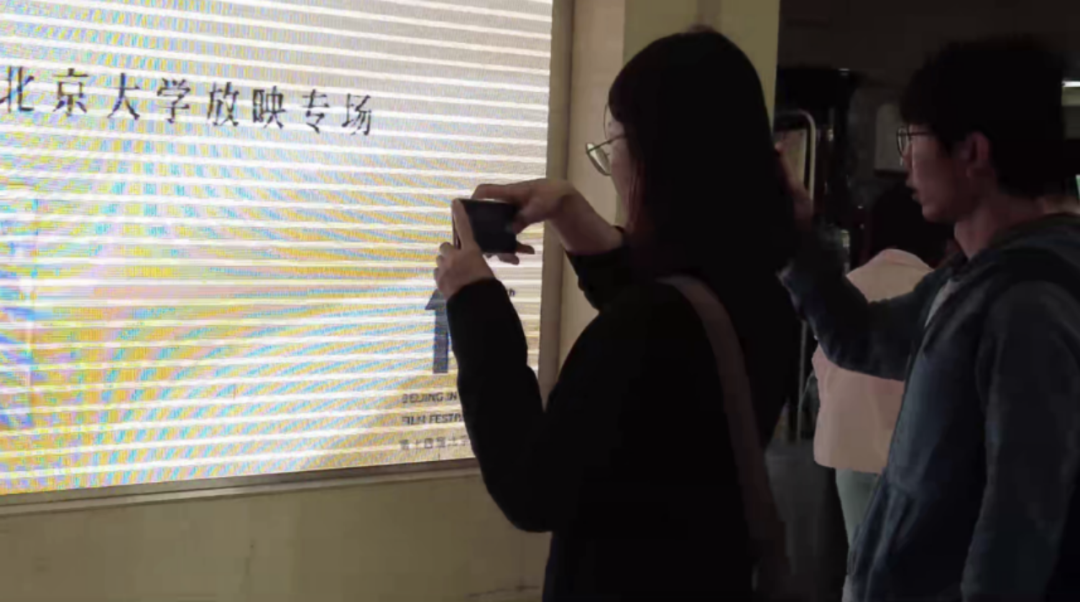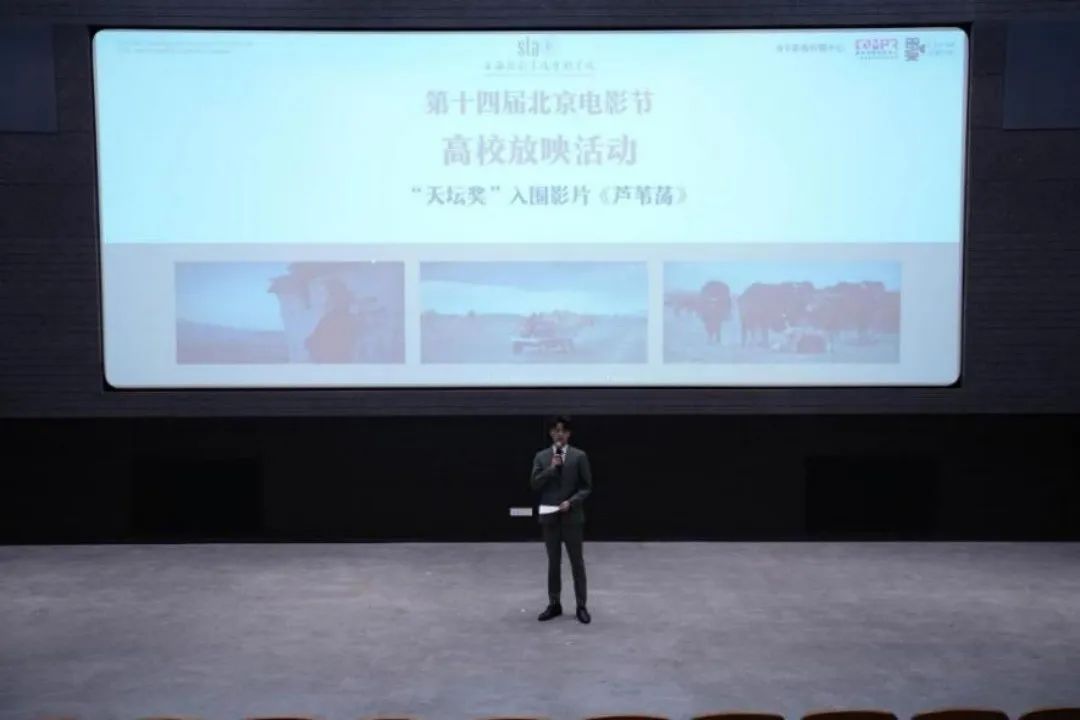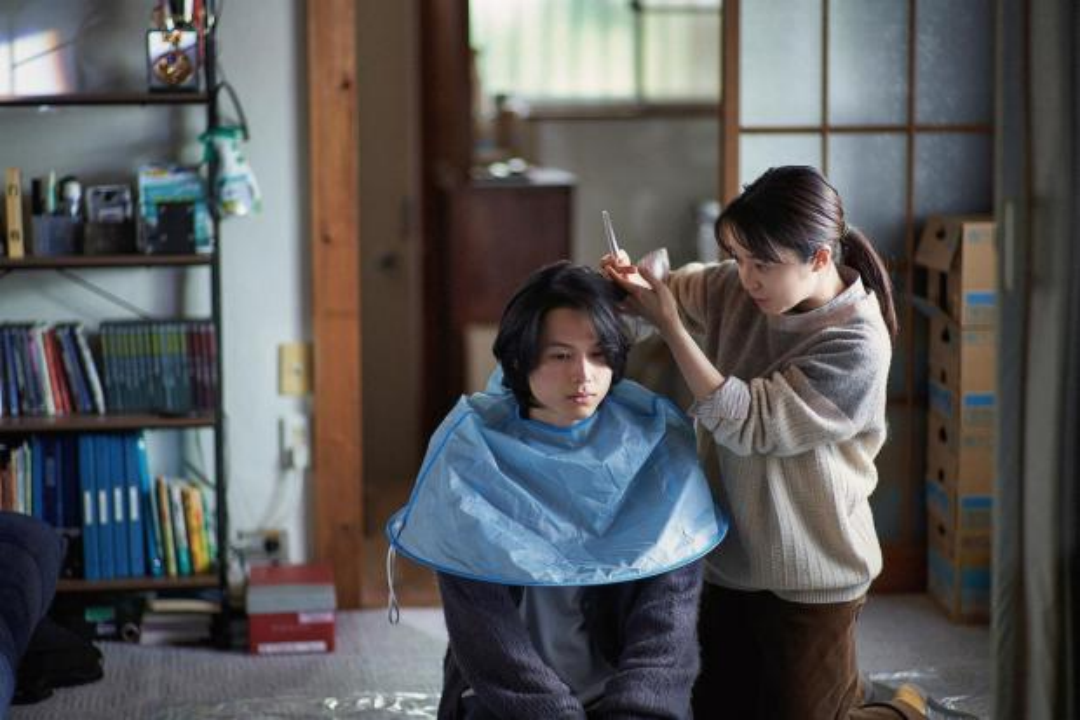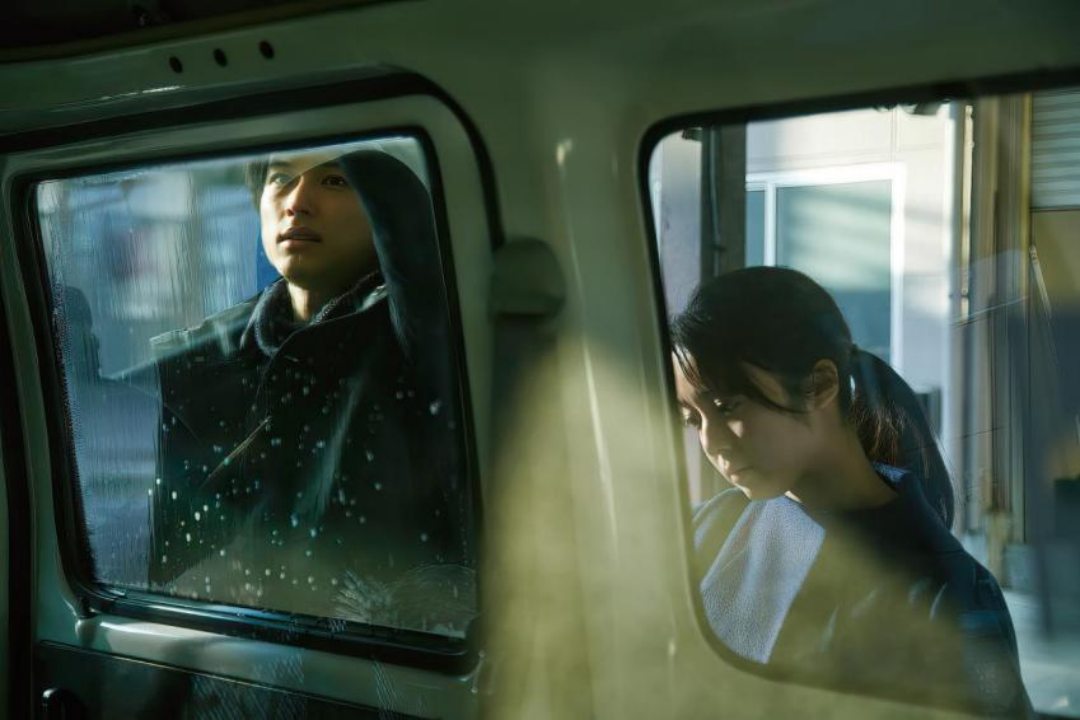Review of Screenings on Campus for Official Selection of 14th BJIFF Tiantan Award
The 14th Beijing International Film Festival (BJIFF) met students in five universities this spring with films, and carried out screenings on campus activities for the Official Selection of Tiantan Award in Peking University, Shanghai Theatre Academy, Shanghai Film Academy of Shanghai University, Hebei Institution of Communications, and Shaanxi Normal University. This is another gathering of the BJIFF with young forces, as well as a cultural exchange between films from all over the world and Chinese new generation.
On April 21, the BJIFF walked into the Peking University Hall with Death Is a Problem for the Living, A Real Job and All the Long Nights, which were nominated for the Official Selection of Tiantan Award, presenting a dialogue about living and life; From April 24 to 26, the screenings of Milk, Not A Word and Stolen at the Hebei Institution of Communications were an exchange on maternal issues; on April 25, the screening of The Ant Woman at the Yanchang Campus of the Shanghai Film Academy of Shanghai University was a space journey into the mind; on April 25, the screenings of Guardians of the Formula and The Reeds at the Shanghai Theatre Academy deeply explored crime and humanity; on April 26, the academic screening salon for A Whole Life hosted by the BJIFF and Shaanxi Normal University in partnership with new media Xibuyingtan was an attempt of reading and interpreting the book of life.

Screening site at Peking University

Screening site at Peking University

Screening site at Shanghai Theatre Academy

Screening site at Shanghai Theatre Academy

Screening site at Shanghai Theatre Academy

Group photo of Special Viewing of
A Whole Life at Shaanxi Normal University in partnership with Xibuyingtan
Through post-screening interviews and students’ short film reviews at Peking University, we can see that they felt intense emotional tension in the absurd and humorous film Death Is a Problem for the Living, experienced the life of French teachers in the real and fresh film A Real Job, and healed in the delicate and warm film All the Long Nights. Students also cheered for the BJIFF, and thanked it for allowing students to appreciate films nominated for the Competition Section of the BJIFF without walking out of the campus. The BJIFF also selected a few wonderful short film reviews from students to share with all of you.

Post-screening interview at Peking University
In Death Is a Problem for the Living, there is a subtle touch of absurdity and madness, in which every character shows a side that is contrary to their superficial personalities. We have no idea whether Risto has made a heartfelt decision in the end, and Arto’s “dedication” to Risto is incomprehensible. After the disease diagnosis and being laughed by others, perhaps he gives up the struggle and his life in order to provoke intense remorse and guilt in Risto (he could have stopped, but he pulls the trigger, leaving Risto with no money). I am really stunned by the plot that Armi shakes the bracelet to the sound the drum in the end, with the whole picture presenting extremely strong emotions in the contrast of music. In one and half an hour, the film uses extremely rich and contrasting soundtracks, and unabashedly adds blood, violence, greed and gambling addiction in the comedy tone.

A still of Death Is a Problem for the Living
I really like the depiction of middle school teachers in A Real Job -- the new teacher who panics at the beginning, the teacher who is suddenly pointed out that the teaching is dull, and the veteran teacher who has taught for many years and worries about whether the teaching is boring. Each teacher has his or her distinct personality and trait, and enjoys the time with students. The group formed by these teachers shows a family atmosphere that I haven’t seen in my middle school. The sunny and charming weather and vibrant teachers are like a surfboard on the sea in the sun, warm and wet.

A still of A Real Job
All the Long Nights continues the typical style of Japanese films, featuring faint sound, delicate and gentle picture, and rich spatial composition, except climactic plots. The film focuses on two young people suffering from the premenstrual syndrome (PMS) and panic disorder respectively. The same drugs, different diseases and skillful action of taking medicine slightly revealed various problems among people with high probability but often ignored. One detail that strikes me in the film is the relief when the man and woman's diseases are diagnosed, perhaps accepting their own problems is the starting point for treatment.

《A still of All the Long Nights
Wu Fangyu, Yuanpei College of Peking University
As the first film I’ve seen at the BJIFF this year, Death Is a Problem for the Living is really an unexpected surprise. "I have no brain" at the beginning strings punchlines of the whole film; "The dead have nothing" cruelly points out that the suicide note is a piece of waste paper when no one cares about it; I’m also deeply touched by the lines, “If you have no choice about one thing, you just can’t make it”.

A still of Death Is a Problem for the Living
I would like to thank the BJIFF for screening films shortlisted for the Tiantan Award at the Peking University Hall this year. I hope more quality films can be introduced to the campus, and that the Peking University Hall can achieve more diversified and superior cooperation in the future.
Dong Zhenting, Law School of Peking University
Thanks to the BJIFF for screening the shortlisted films of the “Tiantan Award” to the campus, so that students can enjoy high-quality films from all over the world without having to grab tickets. I watched A Real Job. At the beginning, I was curious about the teacher group and education ecology in France, but as the storyline unfolded, I was impressed by the precision and truth of this film. The teachers all have their own unique troubles, with some teacher being able to maintain classroom discipline in a neat and effective way but frustrated by students’ evaluation of the teaching as “boring”, some teacher seeming to spend the novice period as a teacher with glasses and short hair, but losing control of his alcoholic son at home, and finally losing control of the classroom, and some teacher seeming to be happy but facing a broken marriage. Each character in this film presents troubles to deal with at their own stage of life, but fortunately, no matter what family problems and career development issues facing them, the trust and support among the colleagues have become the heartwarming power of the story. I also like the director’s camera movement. In the last scene, when the school begins after the summer vacation, teachers greet each other warmly at the school gate and then crowd into the dark passage of the teaching building. When the characters disappear, the film also ends with a new semester, new hope and growth possibilities.

A still of A Real Job
Zheng Tian, College of Urban and Environmental Sciences of Peking University
Since the release of the film list at the BJIFF, I have been looking forward to All the Long Nights by Sho Miyake. The director continues the concern for “defective” people in Small, Slow But Steady, presenting such a warm story with soft tones and eloquent narratives. The two characters suffering from mental distress have experienced the course of onset, improvement and recurrence, like the change of day and night and the four seasons. They support and comfort each other, silently guard and bless each other, and wait for the dawn that will always come. Watching a movie alone and together with other people can bring different emotional ups and downs. I am so lucky to emotionally resonate with everyone at the Peking University Hall, as the delicate emotions in the film make us more connected off the screen, bringing wonderful experience. Besides, the screening of several films nominated for the Competition Section of the BJIFF Tiantan Award at the Peking University Hall is very surprising, allowing us to watch movies without grabbing a ticket. I hope more movies can be arranged in the future.

Liao Yuhan, School of Life Sciences of Peking University
At an academic salon hosted by the Shaanxi Normal University in partnership with new media Xibuyingtan, scholar guests such as Ma Congmin, Nan Hua, Li Yaqi, Zhang Yeqi, Yang Fan and Wang Yaqi respectively shared their thoughts and feelings about the film A Whole Life.

Scholar guests share views
“In the age when short videos influence public perception, I wish to extend my gratitude to audiences who are still willing to feel the pure beauty of images and the changes in modes of transportation and production amid the impact of various modern elements in the early 20th century, and who are always concerned and curious about the modern historical process of the world and the spiritual history of an ordinary person in another cultural and geographical environment.”
--Teacher Zhang Yeqi
“In this film, life is indeed a journey of frustration. The protagonist Egger is always on the road, as he doesn't know where he comes from and where to go. At the end of the film, when the driver reaches the last stop, a whole life of Egger overlaps on the screen. When recalling different stages of his life, many faces emerge, some he once hated and some he once loved. Such image expression brings powerful empathy to viewers.”
--Teacher Ma Congmin

A still of A Whole Life
“Each nation’s cinema has its own motif. For example, German cinema has been discussing death, soul, body, loneliness, happiness and in what sense a man is called a real person. The film thinks about this proposition in a very philosophical and religious state in Germany. However, the philosophical problem is actually difficult to be expressed in images. Director Hans Steinbichler tries to put it in a natural state, showing that life is but a moment, but a man may experience old and new wounds in a whole life, said one of the characters in the film. A real man grows on top of these wounds, and his dignity comes from how to overcome wounds.”
--Teacher Nan Hua
“This film is full of stamina, and at the end of the movie, you can close your eyes and taste the long, fragmented, ordinary but great life. The film with the slice-shaped presentation of life explores death and the meaning of life, and is a stream of consciousness, appearing to be existentialism in Wild Strawberries, or the pursuit of death and meaningless exploration of life in Taste of Cherry. As an audience, there has been a sentence echoing in my mind after watching the movie, ‘Although there are many uncertainties, life is nothing more than that’, which is the meaning of ordinary people's life, death and existence.”
--Teacher Li Yaqi
“Today, the film shows the German philosophical perception of life experiences to the audience in a very concrete way. In the film, there is a line saying ‘I was born on this land, and would die on this land’, which is exactly in line with Heidegger’s vision of ‘man dwells on this earth poetically’. In this world, when we step on the ground and look up at the stars, it’s probably the meaning of human itself. If birds build nests, they will be defeated over and over again but keep trying, which may be life itself.”
--Teacher Yang Fan

A still of A Whole Life
The audience on site also shared that they felt the heaviness of fate from the protagonist of the film. Although we were born in different ages and enjoy different material conditions, there is no doubt that everyone will experience ups and downs in life. The hero Egger also wrote in his diary that throughout his life, there were some things he obtained and a lot of things he failed to obtain. In most of the time, when he was ready to get something, it swiped through his palm in an instant. We can see from the protagonist Egger that everyone has an ordinary and great power when fighting against fate.

Activity site
(The above content is a summary of the activity by Xibuyingtan)
Hope has been constantly ignited by youth waves. This time, the BJIFF walked in universities with 11 films nominated in the Official Selection of Tiantan Award, promoting the exchange between films and filmmakers, films and the new generation, and films and academia. It was the first time for the BJIFF Tiantan Award to launch screenings on campus activities this year, and we look forward to seeing you again next year.
